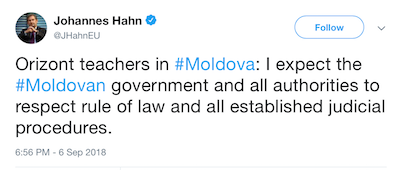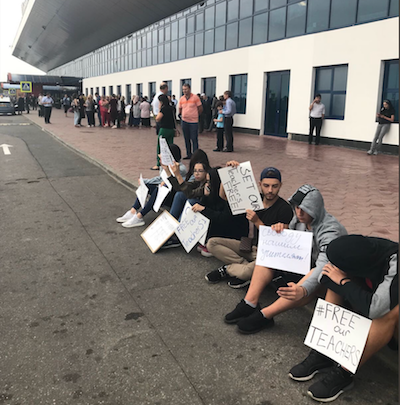European Union officials, European Parliament (EP) members and human rights organizations have called on the Moldovan government to respect the rule of law and stop the deportation of seven Turkish teachers working for a chain of private high schools who were detained by agents of the Moldovan and Turkish intelligence services on Thursday as part of the Turkish government’s global witch hunt against alleged members of the Gülen movement.

#Moldova: I expect the #Moldovan government and all authorities to respect rule of law and all established judicial procedures.”
Monica Macoevi, Rebecca Harms, Helmut Scholz, Pascal Durand, Jose Inacio Faria, Tunne Kelam and Renata Sommer, members of the European Parliament, also released a joint statement and asked the Moldovan government “to stop immediately this abusive extradition.”
“Today early in the morning we were shocked to find out the detainment of these people by Moldovan intelligence officers on their way to their schools or from their house without any legal procedure, with the intention of illegal deportation without any trial or any contact with their lawyers, in violation of basic fundamental rights,” said the statement.

The MEPs added: “We are deeply concerned that it has been completely forgotten that countries are bound to respect international conventions and protocols, which were laid to protect basic human rights. There is a European Convention on extradition issued by the Council of Europe which clearly states in Article 3 that it is forbidden to extradite people for political reasons.”
“Moldova is a country on the European roadmap, sharing the same values as the European Union. It is high time for this country to prove its commitment to this roadmap, by acting in full respect of fundamental rights, the EU Treaties and the EU Charter of Fundamental Rights. We, therefore, ask you to stop immediately this abusive extradition.”

The Turkish nationals worked for a schools network linked to the Gülen movement. “The expulsion of these people to Turkey poses an imminent danger to their life and security and also the risk of not receiving a fair trial,” they wrote in the letter.
A pro-European deputy in parliament, Valeriu Ghiletchi, also demanded more explanations from the country’s intelligence agency, the SIS, in this case. “The expulsion of the seven Turkish citizens raises several questions, and such decisions must be based on clear evidence, not just suspicions,” Ghiletchi stated.
State Secretary of the Ministry of Justice Nicolae Esanu also said the consequences of this action were a cause for concern. “I hope there are solid documents in the SIS dossiers justifying the expulsion of the Turkish citizens because … we can only avoid a conviction from the ECtHR if those expelled do not sue us,” he wrote on Facebook.
The Moldovan intelligence service, SIS, on Thursday issued a press release stating that its officers had detained seven Turkish citizens allegedly involved in “threats to national security.”
SIS insisted that it only expelled the citizens and did not detain them, but without adding any specific details about where they were being held and when they would expel them.
Moldova’s authorities have been accused of violating human rights and democratic standards.
Igor Munteanu, the director of Chisinau-based think tank IDIS Viitorul, told the news website cotidianul.md that SIS had not explained why a private educational chain close to the Gülen movement was deemed a terrorist organization that allegedly threatened the national security of Moldova.
He accused Moldova of “repaying the Turkish leader’s investments … while Dodon will have a palace.”
Munteanu was referring to a deal agreed between Moldovan President Igor Dodon and Turkey for the Turkish government to fund the repair of the Moldovan presidential palace wrecked in street protests in Chisinau in April 2009.
Another analyst, Rosion Vasiloi, pointing to a series of meetings between Moldovan officials from the presidency level and leader of the ruling party Vlad Plahotniuc argued that the latest episode was not a random one.

Moldovan opposition leader Andrei Nastase also condemned the detentions of the Turkish citizens, blaming the “informal alliance” of Dodon and Vlad Plahotniuc.
Moldova’s former Minister of Education Maia Sandu also reacted to the detentions that she called illegal and asked her followers to spread the word.
Maia Sandu (Former Minister of Education of Moldova, @sandumaiamd): Moldavian authorities illegally arrested 7 school principals and teachers!.. They decided to deport these people to Turkey!.. They decided to fight education!.. #MoldovaStopExtradiction pic.twitter.com/TSC68ZU00h
— TRASF Sweden (@trasfswe) September 6, 2018
Moreover, Amnesty International’s Moldova branch has launched an “urgent action” campaign for the detained educators. “Amnesty International Moldova is deeply concerned about the imminent danger to people’s lives and security, as well as the violation of human rights, regarding the administration of the Orizont Lyceum network of the six Turkish citizens’ families, including minors, detained today by the members of the Intelligence and Security Service, in flagrant violation of the procedure for detention, search and lifting, violation of the norms on the freedom and security of persons stipulated in the conventions to which the Republic of Moldova is a party,” Amnesty said in a written statement.
[VIDEO] Woman reveals details of husband's detainment in Moldova || https://t.co/QghKkdiRly pic.twitter.com/xFqdfncZrW
— Turkey Purge (@TurkeyPurge) September 6, 2018
The Turkish teachers were apprehended either on their way to school or in their homes. In one case the SIS agents broke into the house of the detainee. Hasan Karacaoğlu, Hüseyin Bayraktar, Rıza Doğan, Feridun Tüfekçi, Yasin Öz and Müjdat Çelebi are the detained Turkish nationals. Tüfekçi was the principal of the Ceadir-Lunga branch of the schools, and Doğan was the principal of the Durlesti branch.
With the exception of Bayraktar, the teachers all applied for asylum in April 2018 and were expecting a response from Moldovan authorities this month.
In March 2018 the general director of the schools, Turgay Şen, was detained by Moldovan security forces upon the Turkish government’s request for extradition but was released without charges.
Another Turkish educator in Mongolia, Veysel Akçay, was detained in July of this year for extradition at the request of the Turkish government, but due to the intervention of Mongolian authorities and international pressure, he was released.
The Turkish government has launched both a domestic and a global crackdown against the Gülen movement, accusing it of orchestrating a coup attempt on July 15, 2016, although the movement strongly denied any involvement.
More than 100 Gülen-linked Turkish nationals were brought back to Turkey through intelligence service operations and with the cooperation of other countries, including Kosovo, Qatar, Azerbaijan, Malaysia, Gabon, and Myanmar.

















